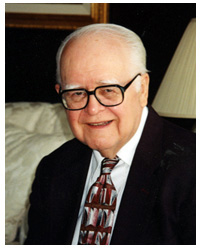Campus News
Computer History Museum honors UCSC computer scientist Harry Huskey
Harry D. Huskey, professor emeritus of computer science at UCSC, will receive the 2013 Fellow Award from the Computer History Museum.
Harry Huskey’s appearance on ‘You Bet Your Life’

Harry Huskey, above, was a young mathematician building the SWAC computer when he was a contestant on Groucho Marx’s You Bet Your Life radio show. In this audio recording of the May 10, 1950 episode, Groucho quizzes Huskey and jokes about the computer. (Hint: It’s hilarious!)
Harry D. Huskey, professor emeritus of computer science at UC Santa Cruz, will receive the 2013 Fellow Award from the Computer History Museum in Mountain View. The prestigious award honors distinguished technology leaders who have forever changed the world with their accomplishments.
Huskey is being recognized “for his seminal work on early and important computing systems and a lifetime of service to computer education.” He came to UC Santa Cruz in 1967 and became a founding faculty member of the computer and information science program.
In addition to Huskey, the other 2013 Fellow Awards honorees are Edwin Catmull, co-founder of Pixar and president of Walt Disney and Pixar Animation Studios, and Robert W. Taylor, a leader in the development of computer networking and modern personal computing. The new fellows will be honored at a ceremony on Saturday, April 27, at the Computer History Museum.
Huskey first became interested in computers in 1944 when he worked on the ENIAC project at the University of Pennsylvania. The ENIAC was the first large-scale electronic computer. In 1947, Huskey spent a year in England, where he worked with Alan Turing on the ACE computer project. He joined the staff of the U.S. National Bureau of Standards in 1948 and was responsible for the design and construction of the National Bureau of Standards Western Automatic Computer (SWAC), the fastest computer of its time.
Huskey later served as a consultant to the Bendix Computer Division of Bendix Corporation, where he was primarily responsible for the design of the Bendix G15 computer. Designed for use by a single person, the G15 has been called the first “personal computer,” although it was the size of two refrigerators. Huskey had a G15 installed in his home in Berkeley in 1955 and later donated it for display at the Smithsonian Institution in 1988.
Huskey was on the faculty at UC Berkeley from 1954 until 1967, when he transferred to UC Santa Cruz. He set up the UCSC Computer Center and served as its director for over ten years. During his time at UCSC, Huskey advised universities in many countries on how to develop academic computer science programs and also helped other universities start their computer centers. He retired in 1986 at the age of 70.
The recipient of many awards and honors, Huskey is a fellow of the Institute of Electrical and Electronics Engineers (IEEE), the British Computer Society, and the American Association for the Advancement of Science (AAAS). He received the 1984 Centennial Award from the IEEE and the 1982 Computer Pioneer Award from the IEEE Computer Society, and he was honored at the Pioneer Session of the National Computer Conference in 1978.